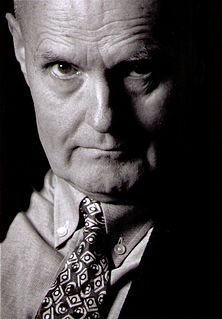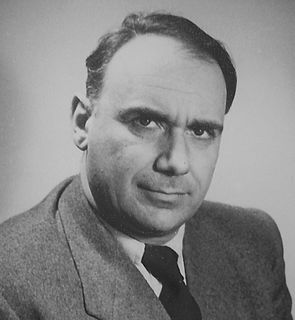Related Research Articles
Friedrich Goldmann was a German composer and conductor.

Günter Kochan was a German composer. He studied with Boris Blacher and was a master student for composition with Hanns Eisler. From 1967 until his retirement in 1991, he worked as professor for musical composition at the Hochschule für Musik "Hanns Eisler". He taught master classes in composition at the Academy of Music and the Academy of Arts, Berlin. He was also secretary of the Music Section of the Academy of Arts from 1972 to 1974 and vice-president of the Association of Composers and Musicologists of the GDR from 1977 to 1982. Kochan is one of eleven laureates to have been awarded the National Prize of the GDR four times. In addition, he received composition prizes in the US and Eastern Europe. He became internationally known in particular for his Symphonies as well as the cantata Die Asche von Birkenau (1965) and his Music for Orchestra No. 2 (1987). His versatile oeuvre included orchestral works, chamber music, choral works, mass songs and film music and is situated between socialist realism and avant-garde.
Thomas Phleps was a German guitarist and musicologist.
Diether de la Motte was a German musician, composer, music theorist, music critic and academic teacher.
Matthias Herrmann is a German musicologist and university professor.
Michael Heinemann is a German musicologist and university professor.
Günter Mayer was a German cultural academic and musicologist.
Gerd Rienäcker was a German musicologist.
Karl Ottomar Treibmann was a German composer and music educator. From 1981 until his retirement in 2001, he was professor of music theory and Tonsatz at the Leipzig University. He was one of the representatives of modernity in the German Democratic Republic, whose great major works can be found in the areas of opera, symphony and chamber music.
Tiburtius Tibor Kneif was a German-Hungarian lawyer and musicologist.

Ulrike Liedtke is a German musicologist and politician (SPD). From 1991 to 2014 she was founding director of the Musikakademie Rheinsberg. Since 2014 she has been a member of the Landtag of Brandenburg. After her re-election in 2019 she was elected President of the Landtag.
Christian Münch is a German composer, organist, pianist and conductor.
The Komponisten der Gegenwart (KDG) is a music encyclopedia in German language about composers of the 20th and 21st century. It is a looseleaf service with information on currently about 900 composers.

Fritz Hennenberg is a German musicologist and dramaturg.
Peter Petersen is a German musicologist.
Eva-Maria Houben is a German composer, organist, pianist, musicologist and university lecturer.
Jürgen Elsner is a German music ethnologist and author.
Nathan "Noto" Notowicz was a German musicologist and composer.

Harry Goldschmidt was a Swiss musicologist.
Fritz Reuter was a German musicologist, music educator, composer and Kapellmeister. Reuter was one of the most important German music educators of the 20th century. After studying music and musicology in Dresden and Leipzig, with Teichmüller, Riemann, Schering and Abert, he received his doctorate in 1922. In 1945, he was appointed Kapellmeister at the Volksoper in Dresden. In 1949, he was appointed as the first professor of music education at a German university. He was also director of institutes at the Martin Luther University of Halle-Wittenberg and the Humboldt University Berlin. In 1955, he was one of the initiators of the first Hallische Musiktage.
References
- ↑ Das Konzert Theorie einer Kulturform on WorldCat
- ↑ Musik und Musikpolitik im faschistischen Deutschland on WorldCat
- ↑ Der Komponist Isang Yun on WorldCat
- ↑ Komponisten der Gegenwart. Bd. 1 on WorldCat
- ↑ Zwischen Aufklärung & Kulturindustrie : Festschrift für Georg Knepler zum 85. Geburtstag / 2 Musik, Theater on WorldCat
- ↑ Charles Ives, 1874-1954 : amerikanischer Pionier der Neuen Musik on WorldCat
- ↑ Musik und : eine Schriftenreihe der Hochschule für Musik und Theater Hamburg on WorldCat
- ↑ Zwischen : Musik und andere Künste : Schriftenreihe on WorldCat
- ↑ Das Wort in instrumentaler Musik : die Ritornelle in Schuberts Winterreise on WorldCat
- ↑ "Entartete Musik" 1938-- Weimar und die Ambivalenz : ein Projekt der Hochschule für Musik Franz Liszt Weimar zum Kulturstadtjahr 1999 on WorldCat
- ↑ Die Ehrenmitglieder der Staatstheater Stuttgart 1912-2018 Theatergeschichte in Portraits on WorldCat
- ↑ Musik-Kontexte : Festschrift für Hanns-Werner Heister on WorldCat